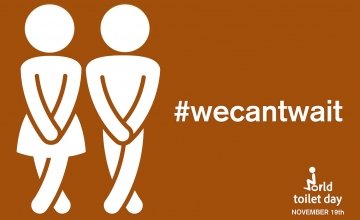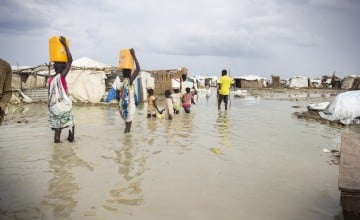
Read our 2024 annual report

Knowledge Hub
We can’t wait: World Toilet Day 2016

Saturday 19 November is World Toilet Day. It’s time to stop being embarrassed about poo and start to talk dirty, says Franck Flachenberg, Concern’s Environmental Health Technical Advisor.
Picture the scene: you urgently need to go to the loo. You look around for the nearest toilet and realise with a sinking heart there is no facility around. Where do you go? What do you do?
How would you feel if you had to go to the toilet out in the open every single day? No privacy, no dignity and nowhere to wash your hands afterwards. Do you feel disgusted? Of course you do. No one should have to live like this.
Stark reality for 2.5 billion people
But this is the stark reality for some 2.5 billion people in the world who do not have access to proper sanitation, including latrines. Almost one-seventh of the world’s population live in urban slums where a lack of access to safe toilets and adequate sanitation is the most acute.
It is common knowledge for us that without toilets, human waste can impact an entire community. Open defecation poses serious health risks, particularly to children. Every year more children die from diarrhoea-related disease than from HIV, malaria and tuberculosis combined.
This horrendous situation could be remedied by ensuring that everyone has access to improved sanitation and hygiene facilities, including supplies of clean water.
Proper toilets prevent disease
Water and sanitation programmes are a key component of Concern’s overseas work. In my role as Environmental Health Adviser, I spend a lot of time thinking and talking about toilets. In 2014, I worked in South Sudan, the world’s youngest country, where there is an estimated 1.4 million internally displaced people. That is a staggering number of people with no fixed homes and little to no access to sanitation. We are working on latrine construction, hygiene promotion and clean water provision to help improve the situation.

Work on sanitation must have a gendered dimension. A lack of privacy for women and girls increases the risk of sexual violence. Many toilets do not have any facilities to help women and girls manage their menstrual hygiene. If toilet blocks are not lit properly, women will not use them as they fear for their safety. A theme of World Toilet Day is “Equality and Dignity” and I strongly believe that equality is an important component of any sanitation programme.
Newly-constructed latrine blocks need to have large pictures of women on the women-only toilet blocks, so that toilets can be separated for men and women. This affords women greater safety and privacy. Simple locks can be affixed to the doors using nail and string; this is a simple, cheap measure which vastly improves the dignity afforded to women.
Prevent diarrhoea & prevent death
But it is not enough to simply build toilets – people need information on how they can protect themselves from getting diarrhoea. A survey I conducted in South Sudan earlier this year on the causes of diarrhoea revealed that people associated diarrhoea with eating cold food, stating they do not get sick from hot meals. This is logical; the heat would kill off bacteria whereas a cold meal indicates that the food has been cooked some time ago. However, people did not make the link between uncovered food (which is exposed to flies) and contamination.
Moreover, no one mentioned the importance of using the lid for the toilet. In a latrine without a lid, flies go in and out and subsequently contaminate food, causing diarrhoea. In addition, unclean hands preparing food was not recognised as a reason for food contamination. Gathering this sort of knowledge can help us to build a shared understanding of what should be done to prevent diseases in the affected communities and how we can provide targeted messages to improve behaviours.

We need to talk about…faeces
In general, in most cultures (as in ours), people are reluctant to talk about faeces. This is something we are continually working on with families and communities to promote good hygiene and health practices. We are indeed fortunate that that new and innovative solutions are appearing all the time.
In South Sudan where flooding has rendered hundreds of latrines unusable, we have successfully piloted the use of PeePoo bags. These are self-sanitising and fully biodegrable toilets designed for a single use. Given the current constraints on latrine construction caused by a lack of dry land, the PeePoo bags offer a potentially effective means of addressing the sanitation gap until more permanent measures can be put in place.
Another innovative way of improving hygiene awareness is the Glo Germ. This ‘makes visible the invisible’ by using UV light to show that hands can be dirty even if they look clean to the naked eye. It can then be demonstrated that the only way to thoroughly clean your hands is by washing with soap. An entire kit, which is sufficient for up to 100 washes, costs less than €100.
Like so many development issues, we still need the political will and financial support to make sanitation for all a reality. We must prioritise sanitation as an important global issue and encourage open dialogue instead of open defecation.
To find out more about our work on water, hygiene and sanitation, hit the button below.





